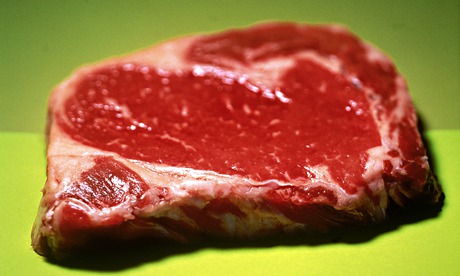
I finally know what it must have felt like to be Nelson Mandela. Only without the decades of incarceration. Or the human rights abuses. OK, I have no idea what it felt like to be Nelson Mandela. But I am certainly getting a sense of what it feels like to be a fighter in a rag-tag rebel force whose cause has finally been recognised as virtuous. I am a one-time pariah who has been accepted back into the mainstream as a speaker of truth. I am the Luke Skywalker of food. Here's what's happened: after decades of conflict, of name-calling and bitterness and Gillian-bloody-McKeith and "lean" bacon – I mean, really! – the war on dietary fat is over. Fat, on whose behalf I fought so valiantly, is no longer the enemy. It is our friend. At last I may step out of the rhetorical forest and lay down my less than rhetorical steak knife.
We know the war on fat is over because recently Time magazine made it their cover story. Johnny-come-bloody-latelys. Oh yeah. You're smearing yourself in the stuff now. But where were you when those of us in the vanguard were up to our nipples in lard, wrestling with the nutritional naysayers? Where were you when I was scarfing six bags of pork scratchings in one sitting just to make a point? In the low-fat aisle, smugly clutching tubs of low-fat "butter". That's where.
Exactly four years ago I wrote a column in this space extolling the virtues of fat. It's where the flavour is. I declared that, were my family forced to eat me due to the economic downturn I would at least make for a good dinner on account of the way my luscious arse is marbled. I dreamed about self-consumption. Sample below-the-line comments: "irresponsible article" and "I hope that Rayner enjoys his bypass operation" and "fat also lines your arteries so thanks, but no thanks".
Who's outraged now, eh? It turns out that much of what we had been told was wrong: that there are good and bad cholesterols, that they can cancel each other out, that the fats in dairy and red meat are almost as good for you as those in fish. And anyway, it's sugar that kills.
As fats came out of food, so the sugars went in. Between 1980 and 2011 diabetes levels in the US rose 157% as the population followed government advice and went face down in the carbs. Which not only gave us more calories, but also slowed down our metabolism and made us feel hungry. Last autumn Sweden became the first developed nation to issue health advice rejecting low-fat high-carb dogma. And as the Swedes are basically cooler than everyone at everything ever and always right, arguing is pointless.
In the end, of course, it all comes back to the same thing: the pathologising of our dinner time. You can only fight wars over what you eat if people are willing to take sides. I recognise that I am as guilty of this as anyone. But then I've had little choice. So much pseudo-medicine is spouted about nutrition, usually as a cover for picky eating, that not rolling up your sleeves and wading in requires a self-restraint I simply do not have. Then again, you probably know that self-restraint and I have never been the best of friends. Now leave me in peace. There's a fat-ballasted rib eye which needs my attention. I regard it as the spoils of war, valiantly won. It shall be mine.
jay.rayner@observer.co.uk

